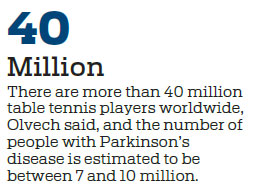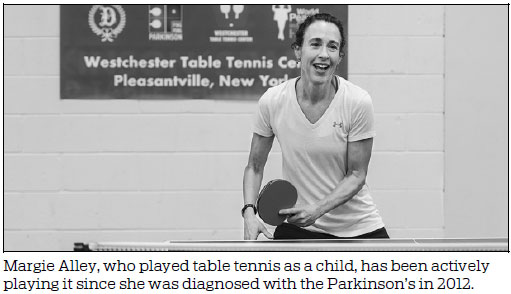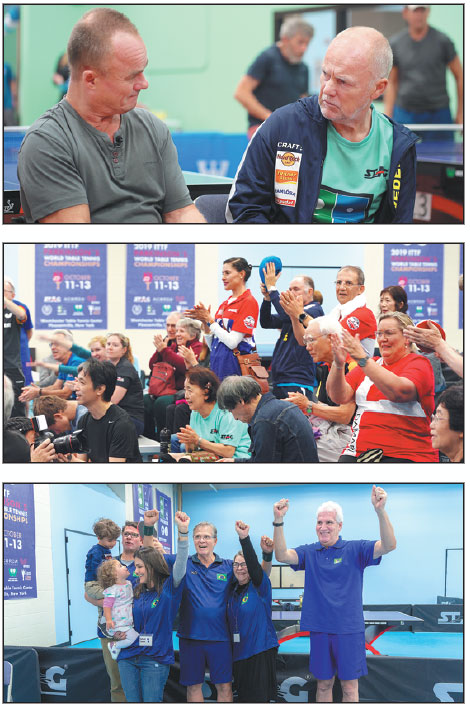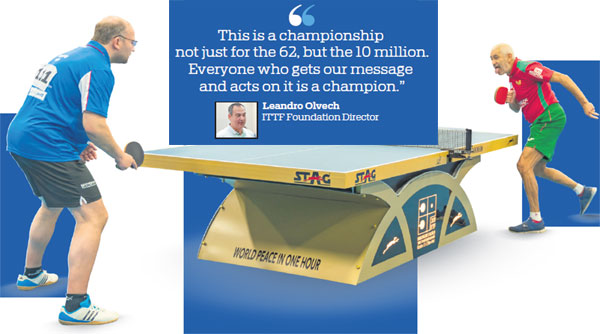The power of ping-pong over Parkinson's
Those with the Parkinson's are finding that table tennis has therapeutic value
"If you go, I will go with you," said Lars Svensson to his elder brother Jan-Erik Svensson on hearing that the latter wanted to take part in the first World Parkinson's Table Tennis Championship in Pleasantville, 50 kilometers from New York.
The Swedish brothers turned up for the event in mid-October in which 62 players from 11 countries took up paddles to play for health, for a sense of camaraderie, and to "shake the world", in the words of Nenad Bach, a Croatian living in New York whose life experiences inspired the event.
"There are nine years between my big brother and me," said Lars Svensson, 67, who was born with a condition that prevented him from walking. He attended the event in a wheelchair.
|
Top: Lars Svensson from Sweden with his elder brother Jan-Erik Svensson. Middle: Applauding for the brave souls. Bottom: The entire family coming out to show support for their loved ones. |
|
The First World Parkison's Table Tennis Championship was held between Oct 11 and 13 in Pleasantville, New York. |
"When I was a young boy, he was always very supportive to me ... We came from a country where a lot of people played table tennis. Naturally both of us started to play at a young age, around 7 or 8. And we played together, with my brother helping me with the tactics."
Despite the daunting physical challenge, the young Svensson was so good that he later joined the Swedish National Team for the Disabled and competed in Nordic and European competitions representing his country. But both brothers eventually stopped, either finding new interests or becoming preoccupied with family duties.
That was until 2011, when the elder Svensson was diagnosed with Parkinson's disease.
"We started playing together again, since table tennis is considered among the best exercises for Parkinson's patients," the younger brother said. "And when he told me that he wanted to participate in the championship in New York, I tried to be there for him to the extent that he wanted."
Parkinson's has clearly affected the elder Svensson's ability to move and to speak, but one thing he was not missing out on was the sheer fun and joy of the event. During the finals, a player's arrival at the table was always accompanied by upbeat music pumped into the venue by a DJ. Unlike in a conventional championship where tension is palpable and everyone watches with bated breath, cheers broke out from time to time from the spectators, sometimes solicited by the players themselves, many of whom took time to interact with the audience.
The event was staged by the International Table Tennis Federation (ITTF) Foundation in conjunction with Ping Pong Parkinson, a local NGO set up in March 2017 with the goal of halting the progression of the Parkinson's disease by using ping-pong as a form of physical therapy. Members of the PPP, who call themselves "Pongers", meet every Wednesday at the Westchester Table Tennis Club to play with volunteers.
Margie Alley, a social worker who for the past 20 years has been offering counseling for disabled children and their parents, is an active member. Alley, a natural-born athlete who once played tennis professionally, said she was "freaked out" on finding out that the mysterious condition that had given her clamping feet and elbow stiffness was Parkinson's.
"That was in March 2012, and I was just one month shy of 49."

What followed was a round of physical therapy, in the same building as the Westchester Table Tennis Club. Out of curiosity, she popped in one day and was immediately seduced by a sport she used to play with her father in the basement of her family home.
Alley was the women's singles winner in the tournament in Pleasantville, a victory her 80-year-old father witnessed. At PPP's weekly event she is both a patient and a volunteer who is paired with other patients during play.
"All the brain and body activities combined together has made me feel better and function more fluidly than I did prior to playing table tennis," she said.
"Parkinson's is affecting my motor skills but not so much my reflexes. With ping-pong you shuffle instead of running around, you use your forearm instead of the entire arm. Although I'm right now playing ping-pong, boxing and tennis, my future is with ping-pong."
For the past six years Alley has been taking part in a research led by Lori Quinn, associate professor of movement science and kinesiology at Columbia University, New York, on how physical exercise can help stop the progression of neurological degeneration.
"People with Parkinson's disease have difficulty initiating movement, and can often perform better when movements are in response to an external stimulus," Quinn said.
"Table Tennis is a unique activity because movement is largely initiated based on response to a visual stimulus - an approaching ball that needs to be hit.
"Table tennis also has several other features that make it a great sport for people with Parkinson's disease. It challenges a person's dynamic balance - their ability to maintain upright standing while reaching with their arms in many different directions. It also can have an aerobic component if the skill level is high enough. Aerobic exercise requires the heart rate to exceed a certain percentage of its maximum (usually 55 to 85 percent), and this can be achieved with continuous ping pong activity.
"Finally, table tennis requires hand-eye coordination, which is important for many everyday functional tasks."
Quinn's observation is echoed by Navin Kumar of Gaithersburg, Maryland, who has played table tennis since his diagnosis in 2013.
"Table Tennis is very unusual because with the speed at which that ball moves, it does something to the brain that allows me to escape all the medical struggles that I face, the tremor included," he said, hitting a few balls with a fellow player to demonstrate how the shaking stops once he picks up a paddle.
Another who has benefited from playing ping-pong is the PPP founder Nenad Bach. The guitarist and composer, whose meeting last year with officials of the International Table Tennis Foundation gave birth to the championship in Pleasantville, nearly lost his way with his beloved instrument.
"I stopped playing the guitar five years after I was diagnosed with Parkinson's, but then I started playing table tennis and I felt 50 percent better. Now I'm playing the guitar again."

For other people, the act of playing ping-pong in public alone is profound on a personal level.
"I didn't know before that our event could become a chance for people to come out of the closet and admit that they have Parkinson's," said ITTF Foundation Director Leandro Olvech, reflecting on the fact that some players flew for 15 or more hours to be at the event, from countries including Japan and Australia.
There are more than 40 million table tennis players worldwide, Olvech said, and the number of people with Parkinson's disease is estimated to be between 7 and 10 million.
"This is a championship not just for the 62, but the 10 million. Everyone who gets our message and acts on it is a champion."
zhaoxu@chinadaily.com.cn

(China Daily Global 10/30/2019 page15)




















